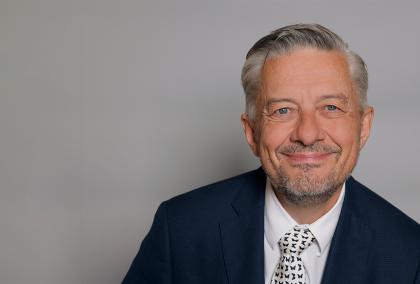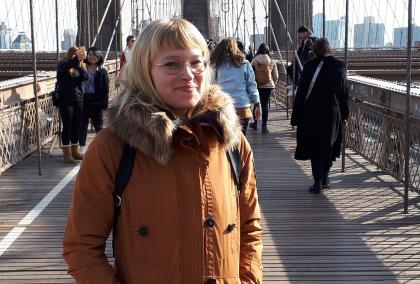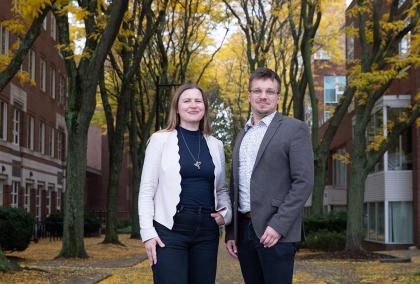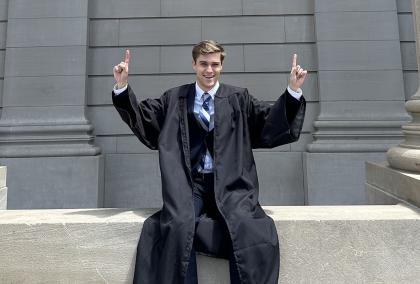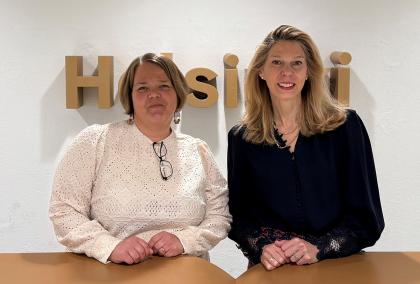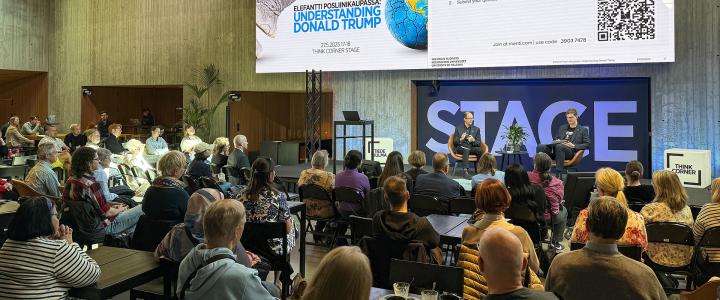

Political scientist Joshua Wilson and international relations scholar Ulla-Stina Henttonen both know what it means to step out of the archive and into the media spotlight - and indeed, increasingly see this as a crucial part of their role as academic researchers.
“We’re trained to speak to narrow audiences, to other experts, but I believe we should be continually engaging with the public, to give them the larger context to think more constructively about events,” says Josh, who is currently 2024-25 Fulbright Bicentennial Chair in American Studies at the University of Helsinki. “In politics, there’s a constant stream of headlines. That’s very disorienting. And I feel like a really valuable thing that academics – political scientists, historians, sociologists – can provide is to pause and show how the everyday headline relates to bigger themes.”
The ability and the willingness to reach out and make our expertise accessible and understandable and relevant to the wider society is really key.
Ulla, a PhD researcher at Tampere University and a recent ASLA-Fulbright Pre-Doctoral Research Fellow at George Washington University, agrees. “I think often the true value of our research work is measured in its impact, and that’s rarely just by communicating within that research bubble,” she explains. “The ability and the willingness to reach out, and make our expertise accessible, understandable and relevant to the wider society is really key.”
But what led each of them to begin communicating their research to wider audiences, and what have they learned along the way?
Communicating to a Wider Audience
Josh explains that his research focuses on modern American conservatism, particularly the Christian Right. In addition to his academic work, he has written extensively for outlets like The Washington Post and Newsweek, as well being regularly cited in the media and appearing on podcasts and television interviews. His original Fulbright project aimed to explore how the Republican Party historically realigned its voter base, using archival research from the Reagan and Nixon eras. However, once in Finland, he explains, he realised he had an opportunity to do more.
“Being in Finland, I wanted my work to be much more connected to the place,” he explains. “In the U.S., I do a lot of public outreach. I’ve written a lot of op-eds, I do a fair number of media interviews, and I do public talks whenever I can. I really wanted to continue that here in Finland.”
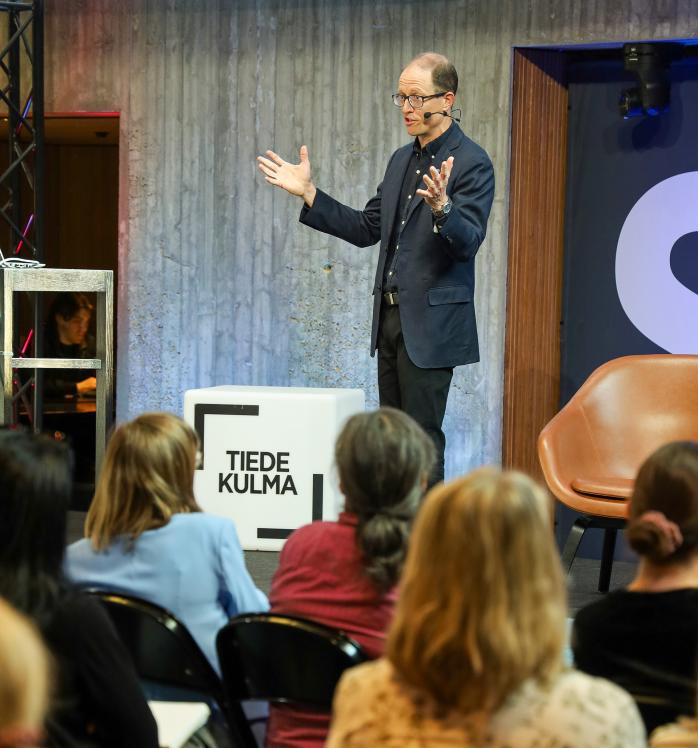
Over the past year, Josh has made public engagement a central part of his Fulbright activities, giving a series of talks in ten Finnish high schools, in addition to public lectures at university and other venues, as well as participating in media discussions. “When I arrived in Finland, it was good timing in the sense that there was a big U.S. presidential election coming up. People were paying a lot of attention to it, and I could speak to that, so that really ended up being the focus of a lot of my time here.”
Ulla has also recently been called upon by the Finnish media to share her expertise on the U.S., including appearing on Yle’s Suomi on amerikkalainen (Finland is American) documentary series. After completing her master’s at Johns Hopkins University, SAIS, and later working in science communication and public affairs in Finland, she returned to academia to pursue a part-time PhD at Tampere University, focusing on international relations and national security, specifically U.S.-North Korea relations. As a Fulbright pre-doctoral scholar, she spent six months at George Washington University in Washington, DC in 2024, accompanied by her husband and infant daughter.
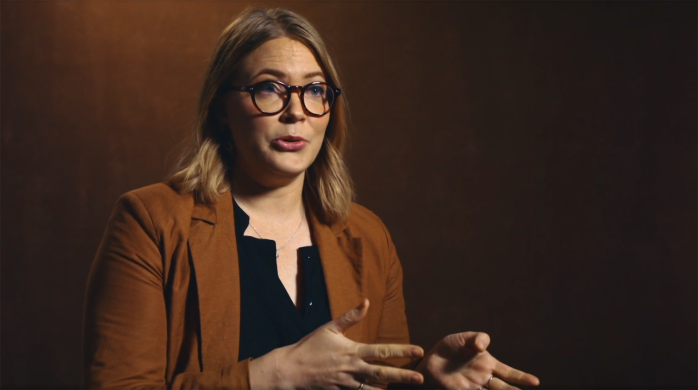
“I’ve always worked a lot in science communication. Fulbright gave me the opportunity to experience that from the U.S. side, too. I think in the U.S. there is more emphasis from academic institutions on ensuring their experts are visible, and supporting them to work with the media,” she points out, arguing that universities need to support and equip researchers to do more public outreach. “They need to encourage their experts to get their voices heard.”
Demonstrating the Public Value of Higher Education
While both scholars speak passionately about the importance of public communication, they admit it comes with challenges.
Public engagement is not just about bringing useful information to the public that they otherwise might not have access to. It is also about having the public recognize higher education and research’s value, and thus why it needs to be supported
and – increasingly – protected.
“We’re often hesitant to put ourselves out there, but if we don’t, someone with less understanding but more confidence will fill the void,” Ulla contends, and while researchers sometimes bemoan misinterpretation or mischaracterization of their work in the media, the experts need to speak up to ensure research is reported accurately. “I think there is a lot of responsibility that goes to us as researchers and as experts in making ourselves and our work accessible.”
But the potential impact of public engagement goes beyond the individual researcher, project, or even institution, Josh argues: “It’s also incredibly important for scholars to engage with the public because the public does not really understand what we do and why they should support it. Higher education is vulnerable to attack as a result, and we are seeing this play out quite dramatically right now.”
“Public engagement is not just about bringing useful information to the public that they otherwise might not have access to. It is also about having the public recognize higher education and research’s value, and thus why it needs to be supported and – increasingly – protected,” he adds.
Having a Clear Message – and Learning How to Convey It
How can researchers get their message across when the topic itself is often controversial?
“I tend to not come at op-eds with the argument of, ‘I want to convince you this policy is right or wrong.’ I try to show how what we’re seeing fits into a larger context,” says Josh.
“All of my academic work has been about interviewing conservatives, and there’s usually a lot of initial pushback. So one of the things I had to think about early in my career was how do you gain trust with people who are predisposed to not trust you? It’s something that I’ve always had to work on, and it translates nicely into op-ed writing. How do you present things so that they don’t produce an initial response that shuts somebody down, that makes them not want to engage?”
Neither Josh nor Ulla claim to have all the answers, but both offer practical advice for researchers considering taking their first step into public discourse.
“You need to prepare differently depending on the platform,” Josh emphasizes. “For a TV interview, you go in thinking: here are the points I hope I can make.You need to pay attention to the way the interview is developing and don’t say yes to things or feel that you need to comment on things where you don’t have sufficient expertise.”
“For an op-ed, you’ve got 800 words, but that’s kind of a sweet spot. You can make one clear point, and you can add some nuance. I always tell my students to think about how you would explain an academic paper to a relative around a holiday dinner table – that helps you think about how to translate academic work into accessible forms,” he says.
“You need to ‘embrace the discomfort,’” Ulla adds, smiling. “I was a nervous wreck for two weeks before my first TV interview,” Ulla recalls. “But afterwards, when my husband asked how it went, I said: I did it. I did a new thing that made me uncomfortable. I did it to the best of my ability, and I’m going to revel in that.”
Ulla also believes researchers need to have a bit more confidence in their abilities and knowledge. “We tend to view our own expertise in very narrow terms. But usually the truth is that we know much more. We shouldn’t be afraid to speak to broader topics, as long as we maintain integrity.”
However, speaking publicly risks public reaction, particularly in the age of social media. “There is definitely risk involved, especially on the topics that I’ve spent most of my career on, like abortion politics – that’s just a minefield, right?” Josh reflects, noting that news outlets sometimes choose a controversial or attention-grabbing headline that can provoke extreme reactions.can provoke extreme reactions.
“Research findings sometimes get viewed as somehow value-laden, or as personal opinions. It can be very harmful and sad if that fear of being targeted for your research makes you shy away from sharing,” says Ulla. “But I think the worst thing we can do is to go deeper and deeper into our own little bubbles where we just talk to each other. The world desperately needs fact-based information.”
The Often-Invisible Impact of Public Engagement
But when it comes to gauging the full impact of all this, you may never know exactly who you’ve reached, and what has changed as a result.
“I’ve had some teachers here in Finland say that students came away from my talks with a new way of thinking about the U.S.,” says Josh. “But with things like op-eds, you send them into the world... and then who knows?” I’ve tried to get my pieces into mainstream magazines and newspapers, simply because there is a larger audience there. I might not be able to track what happens, but at least I know that it’s in this larger venue and so a greater number of people will read it.”
“I think the point is not necessarily to teach people to find their way to the source of the academic knowledge,” adds Ulla. “I think the biggest invisible work happens on the laptops of the journalists. I think there’s a big role for researchers and experts to support the work journalists do by being available, providing information, pointing them in the right direction, ensuring accuracy, because then that filters down into good quality information for broader audiences.”
Changing Perspectives Through Communication
And, while the outcomes are not always quantifiable, the researchers agree the experience of communicating research, particularly in another country and culture, makes a profound impact.
“You know, it’s funny, I was always a little skeptical when people say living abroad is life-changing. But now I get it,” Josh smiles. “It’s both on a personal and professional level, there’s clearly a place for this idea that Fulbright often talks about, of the citizen diplomat. I think it definitely matters.”
“Teaching here is going to change the way I will teach back in the U.S. Finnish and European students didn’t understand why something like abortion is even a political issue, for example. That forced me to explain it better. It sharpened my own thinking,” he adds.
“Your point of view is based so much on your environment, your education, the values you grew up with,” says Ulla. “It’s very hard to get a feel of that just by observing from the outside, but by being immersed into the environment, in the media landscape, the language, you can begin to realize how differently we communicate things and how differently we hear it and interpret them as well.”
“Ever since I came back from the U.S., I find myself often kind of explaining Americans to the Finns. And whenever I’m in the States, of course it’s the other way around. And I think that’s kind of a pretty cool superpower.”
Read the whole Fulbright Finland News 1/2025!
Watch the "Suomi on amerikkalainen" documentary series on Yle Areena.
